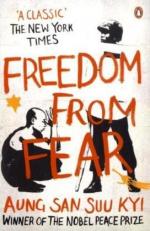
|
| Name: _________________________ | Period: ___________________ |
This test consists of 15 multiple choice questions and 5 short answer questions.
Multiple Choice Questions
1. How did the Burmese initially view the Japanese?
(a) As allies.
(b) As spies for the British.
(c) As oppressors.
(d) As liberators.
2. Which is NOT a cause of decay according to the Buddhists?
(a) Omission to repair that which had been damaged.
(b) The persistent occurence of bad practices.
(c) Leadership of men without morality or learning.
(d) Disregard of the need for reasonable economy.
3. Where was the disintegrating effect of the British rule first felt in Burma?
(a) In upper Burma.
(b) In the Shan Plateau.
(c) In lower Burma.
(d) In western Burma.
4. What was the Burmese approach to life during British occupation?
(a) The Burmese wanted to industrialize and urbanize.
(b) The Burmese continued their village way of life.
(c) The Burmese developed a network of large towns.
(d) The Burmese developed a feudal system.
5. According to Aung San Suu Kyi, what corrupts individuals?
(a) Money.
(b) Greed.
(c) Power.
(d) Fear.
6. What also developed along with the western influence on Burmese language and literature?
(a) Socialism.
(b) Urbanism.
(c) Nationalism.
(d) Christianity.
7. Why does the nationalist theme in Indian literature appear earlier than Burmese literature?
(a) The British had censored the Burmese press during their initial occupation.
(b) Because India was colonized over a century earlier.
(c) The Indians had a stronger political orientation.
(d) The British were more domineering in India.
8. In Suu Kyi's interview with Karan Thapar in August 29, 1988, what does she state as her vision for her role in Burma?
(a) She wants to become a leader as great as her father.
(b) She will hand the reigns of the leadership over to the party chairman.
(c) She will lead from behind the scenes.
(d) She will look for ways in which she can be most of service.
9. Who holds the burden of upholding justice and common decency where no rule of law prevails?
(a) The military.
(b) The police.
(c) The religious orders.
(d) The people.
10. When was Aung San assassinated?
(a) When Aung San Suu Kyi was ten years old.
(b) When Aung San Suu Kyi was two years old.
(c) Before Aung San Suu Kyi was born.
(d) When Aung San Suu Kyi was sixteen years old.
11. In "Belief in Burma's Future," what has sprung up throughout the country because the police can no longer guarantee security in 1988?
(a) Political rallies.
(b) Local vigilante groups.
(c) Riots.
(d) Anarchy.
12. What was the Freedom Bloc?
(a) A workers' union.
(b) A political party.
(c) A junta.
(d) A section of Burma free from British rule.
13. How did the British attempt to pacify the Burmese people during their rule?
(a) By imposing curfews.
(b) By turing their backs on the corruption of local Burmese administrators.
(c) Through intermarriage.
(d) By emphasizing differences among the ethnic groups.
14. Which country had formed a similar committee that is being proposed in "The Formation of a People's Committee"?
(a) China.
(b) Cambodia.
(c) Singapore.
(d) Korea.
15. Why does hope return in Burma?
(a) Because "peace as a goal is an ideal which will not be contested by any government or nation."
(b) Because "human beings the world over need freedom and security."
(c) Because "the struggle for democracy and human rights in Burma is a struggle for life and dignity."
(d) Because "fear is not the natural state of civilized man."
Short Answer Questions
1. Which is not a Burmese ethnic group?
2. Although the Burmese government refused to acknowledge the document, "The Formation of a People's Committee," the government did which of the following?
3. What was Aung San's objective after he resigned as military chief?
4. For Aung San Suu Kyi, how will the forces that produce inequities be conquered?
5. According Suu Kyi, who is oppressing the people of Burma?
|
This section contains 650 words (approx. 3 pages at 300 words per page) |

|




